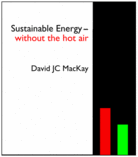‘Sustainable Energy – without the hot air’ by David MacKay
Posted in Books on 01/08/2010 02:13 pm by Stephen Tindale Anyone who cares about the survival of human civilisation should read this book. It is packed with facts and statistics about solutions, and shows that we must stop arguing about which is cheapest or best, because we need all of them. I have been reading books about energy and climate change for the last 20 years and this is the best yet.
Anyone who cares about the survival of human civilisation should read this book. It is packed with facts and statistics about solutions, and shows that we must stop arguing about which is cheapest or best, because we need all of them. I have been reading books about energy and climate change for the last 20 years and this is the best yet.
David MacKay is a physicist. He was a Professor at Cambridge University, but in October was appointed Chief Scientific Adviser to the UK Department of Energy and Climate Change (which was very good news – it is excellent to have someone so committed and knowledgeable working in government). He is a Fellow of the Royal Society and a member of the World Economic Forum Global Agenda Council on Climate Change.
The first part of the book is called Numbers, not adjectives, and this is a good description of the book’s value. It looks at the UK and, in this country, there is definitely a surplus of adjectives about renewables – particularly about wind farms – ‘noisy’, ‘ugly’, ‘bird-shredding’. Or the ones I use: ‘beautiful’, ‘progressive’, ‘symbolic’! There is a similar plethora of adjectives about nuclear – ‘dangerous’, ‘immoral’, ‘cancer-causing’, as well as the infamous (and wrong) ‘cheap’.
However, the book’s greatest value is that MacKay does the sums on how much energy is needed and how much could be obtained from each source. He finds that, however much is achieved in the efficient use of electricity, there will be an increase in the demand for electricity, because surface transport will be electrified and heating will increasingly need electricity. (Heat pumps, which are four times more efficient than ordinary electric heaters and use heat from the ground or air to heat buildings, require electricity to run.) As well as through clear and highly accessible prose, the book presents the sums as bar charts, which are both easily comprehensible and striking.
On the low-carbon ways of producing electricity, he says that CCS is “only a stop-gap”, because it is not zero carbon for either coal or gas. However, he does not say that nuclear power is a stop gap, partly because he argues that uranium could be extracted from seawater and partly because reactors could run on thorium, so overcoming ‘peak uranium’.
MacKay points out that “nuclear power is not infinitely dangerous. It’s just dangerous.” This is correct, though he does not cover the threat of weapons proliferation, which, in my view, is the main danger of nuclear power. Of course, coal and gas are also dangerous, not only as carbon sources, but also through mining and (for gas) leakage and potential explosions. Large hydro dams are also potentially dangerous. The safest energy sources are solar, wind, wave, tidal stream and run-of-river hydro. MacKay has a rather pessimistic chapter called Can we live on renewables? This concludes:
“Yes, technically, Britain has ‘huge’ renewables. But realistically, I don’t think Britain can live on its own renewables – at least not in the way we currently live. I am partly driven to this conclusion by the chorus of opposition that greats any renewable energy proposal. People love renewable energy unless it is bigger than a fig leaf. If the British are good at one thing, it’s saying ‘no’.”
He is sadly right that the British are very good at saying no, and our land use planning system, which has helpfully prevented ribbon development and kept much of the country beautiful, is now the main factor holding back wind farms. However, I think he is too negative about the prospects for renewables in the UK. For example, he suggests that offshore wind farms will be held back by opposition from those who fear that they will interfere with radar. Opposition from the Ministry of Defence and the aviation industry on these grounds has certainly been a problem, but is not insuperable. Schipol airport in the Netherlands is surrounded by wind turbines. This is not because the Dutch are prepared to do without radar. It is because they have invested in more modern radar, for which wind turbines are not a problem. We could and should do the same in the UK, but this will mean extra expenditure, at a time when the UK is de facto bankrupt.
Britain does not have to live on its own renewables – it is possible to import electricity, gas (which can also be renewable, for example from human sewage and farm manure, though the book does not cover this extensively), and also biofuels (which the book does cover well, stating that they will not produce much energy and will prevent food being grown). Britain – a small, windy island – has greater renewable potential than most other countries, but nevertheless MacKay does consider “living on other people’s renewables”, which he accepts would mean paying for them. He describes concentrated solar power in the Sahara, being proposed by DESERTEC Foundation, as “a technology that adds up”. But, again, it won’t be cheap to build a grid to bring the power northwards.
MacKay describes nuclear fusion as “speculative and experimental”, which it certainly is. He could have added ‘extremely expensive’, but he does not, as he covers little economics. He is open about this, but it does mean that the book does not have all the answers. Nevertheless, it is an invaluable read.
The book can be ordered as paper copy, or downloaded free, from Sustainable energy: without hot air.
 David MacKay is a physicist and was a Professor at Cambridge University. In October 2009, he was appointed Chief Scientific Adviser to the UK Department of Energy and Climate Change. He is a Fellow of the Royal Society and a member of the World Economic Forum Global Agenda Council on Climate Change.
David MacKay is a physicist and was a Professor at Cambridge University. In October 2009, he was appointed Chief Scientific Adviser to the UK Department of Energy and Climate Change. He is a Fellow of the Royal Society and a member of the World Economic Forum Global Agenda Council on Climate Change.



06/11/2011 at 12:46 am
I read this book. He had a great quote: Please don’t get me wrong: I’m not trying to be pro-nuclear. I’m just pro-arithmetic. — David MacKay